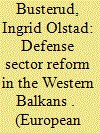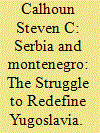| Srl | Item |
| 1 |
ID:
137421


|
|
|
|
|
| Summary/Abstract |
This article analyses two different approaches to defense sector reform (DSR) in the Western Balkans. It explores the role of NATO in the reform process in Bosnia and Herzegovina (BiH), as well as Norway's involvement in Montenegro. Based on this, the article then compares and contrasts the two processes, and looks at the factors that have influenced their success or failure. The analysis show that both BiH and Montenegro have taken significant steps towards Euro-Atlantic integration, and that NATO and Norway have succeeded in part of their work to assist this effort. However, it also suggests that certain key factors for success in SSR have been less than optimal, such as donor coordination and the principle of local ownership. Both actors are also limited by the lack of a conceptual framework or guidelines for their work on DSR.
|
|
|
|
|
|
|
|
|
|
|
|
|
|
|
|
| 2 |
ID:
111574


|
|
|
|
|
| Publication |
2012.
|
| Summary/Abstract |
The article tackles some of the questions that arise from the invocation of "the people" in independence referendums in a contextualized way by examining the constitutional experience of two independence referendums: Quebec's unsuccessful independence referendum in 1995 and Montenegro's successful one in 2006. I argue that democratic theory does not presuppose the unified people as a decision-making unit, but rather that it conceals two, more logically primitive-and to an extent conflicted-general conceptions relevant to independence referendums. While not arbitrating between them, the concluding part argues that the tension in democratic theory ought to, at a minimum, contribute to reducing the vehemence of nationalist politics involved in attempts to achieve political independence.
|
|
|
|
|
|
|
|
|
|
|
|
|
|
|
|
| 3 |
ID:
074574


|
|
|
|
|
| Publication |
2006.
|
| Summary/Abstract |
Montenegro's aspiration to independence from Serbia was fulfilled on 21 May 2006, when Montenegrins voted for independence in a free and fair referendum. The European Union exerted itself as a moral and political authority in this process, at first using its soft power to broker a deal between Serbia and Montenegro, and then helping Montenegro's government and opposition to come to an agreement on the referendum. It is questionable, however, if this was a success for European diplomacy; first of all because the process' success was mainly due to Serbia and Montenegro's correct behaviour, and then because the outcome of the referendum was not exactly the one desired by most European policymakers.
|
|
|
|
|
|
|
|
|
|
|
|
|
|
|
|
| 4 |
ID:
018136


|
|
|
|
|
| Publication |
Autumn 2000.
|
| Description |
62-86
|
|
|
|
|
|
|
|
|
|
|
|
|
|
|
|
| 5 |
ID:
141714


|
|
|
|
|
| Summary/Abstract |
The present study challenges three common assumptions of the international mediation literature. First, it challenges the perception that pure or weak mediators are unable to use manipulative and coercive strategies in the mediation process, but can only resort to facilitating the dialogue and at most formulating a proposal on behalf of the disputants. Secondly, it challenges the perception that only resource-based power can be used to manipulate the process and coerce (and direct) the parties toward mutually acceptable solutions. This misconception is based on the assumption that the expansion of the zone of possible agreement, which is mainly attributed to manipulative strategies, can be achieved only by the employment of carrots and sticks which are often inaccessible to pure or weak mediators. Lastly, it shows how this type of leverage can also indicate a particular bias that an apparent pure mediator might have: bias of outcome.
|
|
|
|
|
|
|
|
|
|
|
|
|
|
|
|